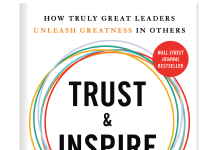
If you want to build a team of Giants, you have to start by first being a Giant. Greatness attracts greatness. More than anything, this primes you to find and attract the best people. Or, when you need to transform a team of ordinary people into extraordinary employees, you must look for the best in them, leading them to become their best selves.
How do you find the best? In many companies, the first thing to do is counterintuitive. That is to hire first based on virtue, then aptitude, experience, skill set, and, last of all, temperament. When that is your approach, you will attract the people with the greatest potential, and as a by-product, you will build a more unified team.
-
Hire Based on Virtue First
If you want to find and lead Giants, hire based on your best perception of virtue. This is not easy and foolproof, but having virtue at the forefront is worth it. Despite great effort, hiring based on personality by using Myers–Briggs and other personality tests fails to measure “earned” virtue and “succumbed” vice. A personality test will reveal inclinations from someone’s earliest years, but will not reveal if that person has personally grown in virtue.
Pay attention to inconsistencies and body language. When retelling a different version of a story, squirminess and gulping may be a sign of dishonesty once you press for details. Ask questions like, “Can you tell me a situation where you sacrificed something for someone else?” If the candidate has genuine examples of sacrifice, it will strongly indicate virtue. Also ask, “Are most people in your life supportive of you, or have you risen above a lack of support?” This question is practical because there is no right or wrong answer for them to guess at. Whether they have been supported or not won’t determine your opinion. It will be more about how they answer, giving you insights. All types of answers could tip you off to a victim mentality or a strong will.
Tools, tests, and techniques aside, virtue is best observed once a candidate is fully functional in their role. Thankfully, the more experience you gain when hiring and leading, the faster you will recognize patterns that lead to vice or virtue.
-
Consider Aptitude Second
Aptitude is the inherent ability to learn. If your company is dynamic, the roles of your people will evolve. Therefore, candidates must have more aptitude than set skills or particular talents. The layered approach of seeking a candidate of high virtue, followed by aptitude, provides you with the best, most flexible candidates who can grow within the organization. When people say that companies must be flexible, adaptable, and willing to grow, they’re really talking about the people who run them.
The key to identifying a candidate with aptitude is to ask questions directly related to problem-solving. Rapid learning of new skills and topics points to aptitude for learning other new things like being in a dynamic role with changing responsibilities for a growing company. A good question to ask is, “What have you learned lately?” Dive in more with, “Have you recently learned anything online for a home project or hobby, or taken a major course?” That question is usually enough to inspire a natural conversation that reveals the candidate’s aptitude.
-
Next, Determine Experience and Skill Set
Many graduates don’t work in the same field as their major. This fact speaks to prioritizing virtue and aptitude ahead of education, particular professional experiences, or degrees. Some jobs require specific degrees, such as law, medicine, and finance, but even those positions are best filled with people of high virtue and aptitude. People often feign virtue, also known as virtue signaling, but when someone has it, it’s unmistakable. Also, experience and skill sets can be lied about. It may land someone a job, but virtue is what leads someone to win or lose in the long run, not skill sets or job experience.
When considering someone for employment, measure their experience and education against their virtues and aptitude. If a person has stayed stagnant but has a brilliant education, it may not be loyalty that kept them there. It might be a lack of understanding, weakness, or apathy—these kinds of things will only be revealed when you question their virtues and aptitude.
-
Finally, Consider Their Temperament
Knowing someone’s personality and temperament allows you to place them in positions where they will thrive and uplift those around them. So, the last step is to evaluate if their temperament will fit their specific role and that position’s broader reach in the organization. Will this person guard the organizational culture, or will they only look out for themselves?
Hippocrates, a Greek physician who lived from 460–377 BC, put forward the idea of four fundamental temperaments:
- Choleric: Exhibits extroversion, quick thinking, decisiveness, self-confidence, and a strong drive to achieve results. Often visionary and goal-oriented.
- Sanguine: Characterized by sociability, enthusiasm, optimism, spontaneity, and liveliness. Sanguines are charismatic and adaptable communicators.
- Melancholic: Displays analytical thinking, detail orientation, organization, sensitivity, and depth. Melancholics are reliable, creative, and reflective individuals.
- Phlegmatic: Possesses calmness, easygoing nature, diplomatic skills, patience, and empathy. Phlegmatics are balanced, good listeners, and adaptable individuals.
Every temperament has a natural virtue and an inherent vice. Cholerics, for example, are results-oriented, motivated, good leaders, visionary, keen to resolve injustices, and they don’t waste time. Left unregulated, the vices of a choleric include that they’ll mow people over to get their way. So, to be a good choleric, you need “earned” virtues to amplify your base temperament and to tame down the vices you’re prone to so you don’t succumb to them. When using the four temperaments as a gauge for hiring, instead of seeing only the risk of negative behavior, ensure you’re also looking at the natural virtues.
Making it Real
By cultivating good, authentic, and beautiful, you’ll achieve the optimal goals of unity, profit, productivity, peace in the workplace, and all other signifiers of success. People will love coming to work, not because of grandiose ideals, but because of the profound simplicity they feel at work. People want to work with those who are committed, loyal, and compassionate, knowing that leadership has their backs. People who love where they work and what they do will find creative ways to succeed. If you start building a deep bench, starting today, you’ll feel confident in those whom you attract, develop, and launch into higher levels of success.




